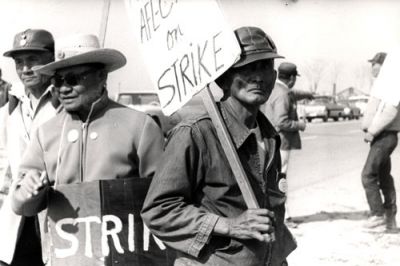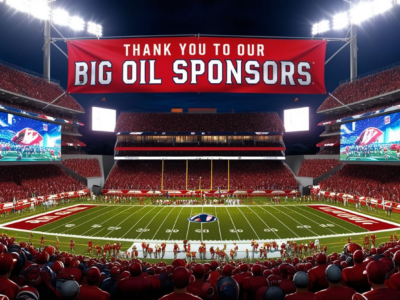Guest Blogger Miriam Seifter: The Environmental Dimension of American Trucking
On Tuesday, the Supreme Court heard argument in American Trucking Associations, Inc. v. City of Los Angeles, a case addressing the preemptive scope of the Federal Aviation Administration Authorization Act (FAAAA). Over at Scotusblog, I’ve discussed the two relatively technical questions presented in the case. The first asks whether two provisions in the Port of Los Angeles’s mandatory concession agreements with motor carriers—one provision requiring off-street parking plans and one requiring the posting of placards on trucks—are saved from FAAAA preemption by some version of a “market participant” exception. The second question asks whether a 1954 case, Castle v. Hayes Freight Lines, Inc., prevents the Port from denying access to noncompliant carriers. At oral argument, the Justices seemed skeptical of the Port’s position on each question, and it seems safe to say the case is a challenging one for the Port and fellow respondent NRDC. The case hasn’t, however, garnered many headlines—not nearly as many as the high-octane gene case and the emotionally intense adoption case that preceded it on the Court’s argument calendar this week. This is in part because ultimately, American Trucking is likely to be decided narrowly based on the specific features of the FAAAA. That said, and of interest to Legal Planet readers, the case could nevertheless have broader environmental implications, and it could be a game-changer for the Port of Los Angeles’s Clean Truck Program and green initiatives at other publicly owned enterprises.
To see why, it helps to back up. The dispute in the case, as southern California readers will know better than I, stems from environmental and community opposition to the Port’s expansion plans. In an effort to overcome this opposition, and to get past the years of environmental litigation that thwarted the Port’s development, the Port introduced a Clean Air Action Plan and Clean Truck Program in 2006 and 2008, respectively. Among other things, the Clean Truck Program requires motor carriers doing business with the Port to use modern, less-polluting trucks—as of 2012, trucks that don’t meet the 2007 Federal Clean Truck Emissions Standards have been banned from the Port— and to comply with a variety of safety and operational standards, including the placard and off-street parking provisions now at issue before the Court.
How might a ruling on the pending questions affect the Clean Truck Program? The leap between the challenged provisions and the Port’s environmental initiatives is not long. This is because both questions presented potentially turn on reasoning that would apply to virtually any requirement the Port imposes. As to the first question presented, regarding whether the off-street parking and placard provisions are preempted, the core question is whether they fall within a limitation in the FAAAA’s preemption clause: The Act preempts certain state and local actions that are “related to a price, route, or service of any motor carrier … with respect to the transportation of property,” but only if those actions have “the force and effect of law.” The Port, an independent division of the city, argues that its concession agreements are akin to private contracts and thus lack the force and effect of law, but American Trucking Associations (ATA) and the federal government (as an amicus) disagree, stressing that the Port’s requirements are incorporated into the Port’s tariff and enforceable by criminal penalties. (The Port is quick to clarify that criminal penalties could be imposed only against marine terminal operators who do business with noncompliant motor carriers, and not against motor carriers themselves, but ATA and the government deem this a distinction without a difference.) At oral argument, the federal government went further, positing that the Port’s requirements would have the force and effect of law even absent the criminal penalties, because the Port is more akin to a regulator of public infrastructure than a commercial participant in the private marketplace. The Justices seemed skeptical of the Port’s argument, and even more skeptical of its alternative position that the requirements fall within an implicit market participant exception to preemption. (Indeed, there seemed to be little support for the existence of such an implicit exception at all, at least in the FAAAA context.)
Because ATA’s force-and-effect-of-law reasoning seems logically to apply to any requirement the Port currently imposes, a ruling that the two challenged provisions are preempted could make vulnerable the Clean Truck Program and its ban on high-polluting trucks. Of course, there would be questions whether the ban in fact relates to routes, prices, or services within the Act’s meaning, and whether it could be said to fall within the Act’s express exception to preemption for certain types of state safety regulation. But denying market-participant protection for the terms of operation between the Port and motor carriers eliminates what might have been insulation for the Port’s initiatives. And American Trucking’s second question presented portends even clearer effects: if the Port cannot deny access to trucks who lack or violate concession agreements because a denial of access to the Port infringes the exclusive federal power to certify trucks to operate in interstate commerce, it follows that the Port may not deny access to carriers for other types of infractions, including violations of the polluting truck ban.
To be sure, ATA didn’t challenge the Clean Truck Program or the truck ban in the lower courts or the Supreme Court. Instead, it took all the way to the Supreme Court a challenge to the more mundane off-street parking and placard provisions. But as the Port hypothesizes in a footnote in its brief, this may well be a test case—or a “potential stealth attack,” as the Port calls it—for a challenge to the truck ban. Tuesday’s oral argument may have provided a glimpse of this possibility. When Justice Sotomayor asked whether the Port could require, in response to a pollution problem, that “only modern trucks can come and unload here,” ATA’s counsel responded simply “No.” Yet that is almost precisely what the Clean Truck Program did when it “established a progressive ban on polluting trucks.” There was no follow-up to this exchange, so the parties’ full, considered positions on the issue remain to be seen. But anyone interested in environmental initiatives at the Port of Los Angeles—and potentially at other publicly owned enterprises—should watch closely for the decision in American Trucking.
Miriam Seifter is a Visiting Researcher at Georgetown University Law Center. She can be reached at mls286@law.georgetown.edu.







Reader Comments